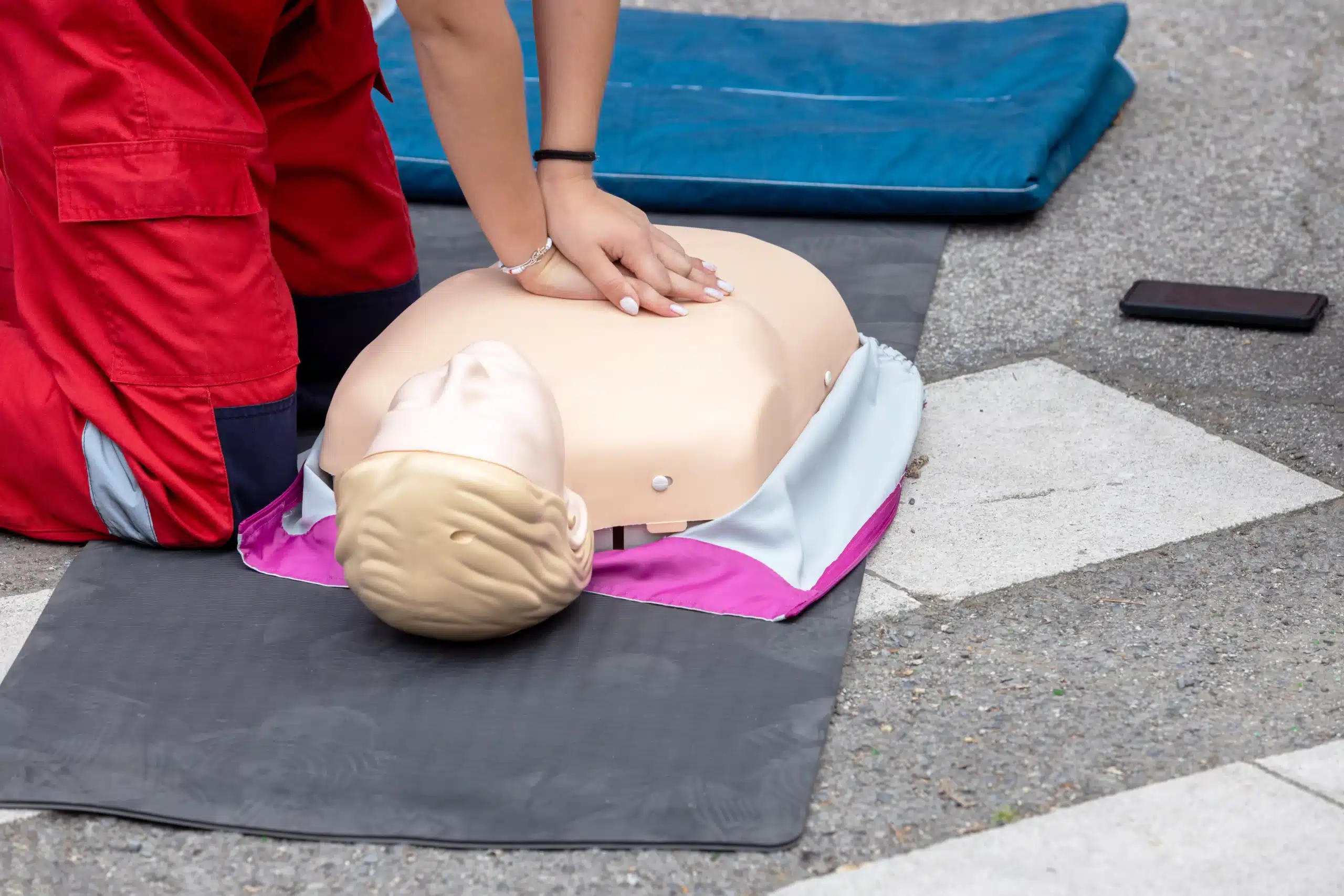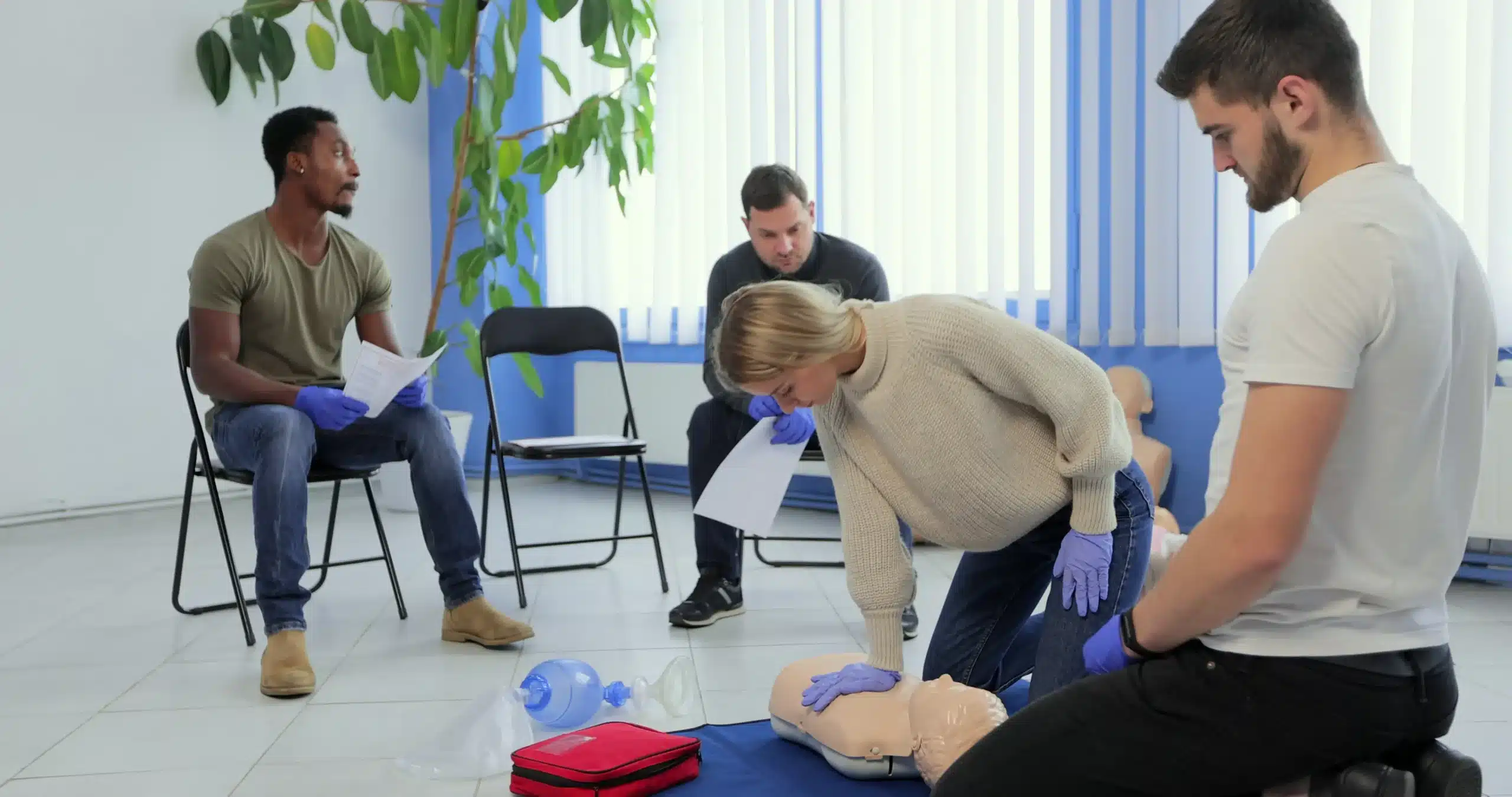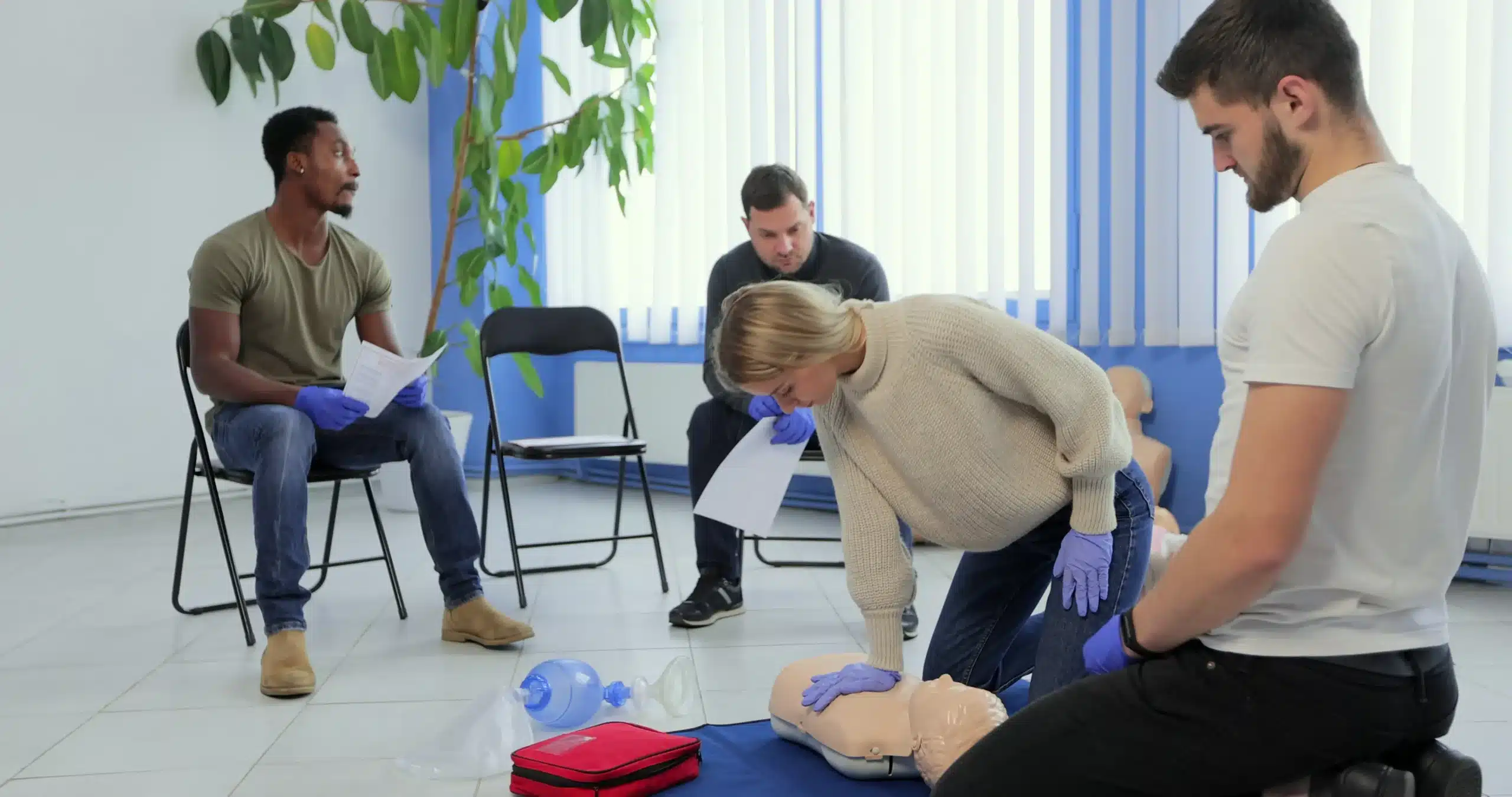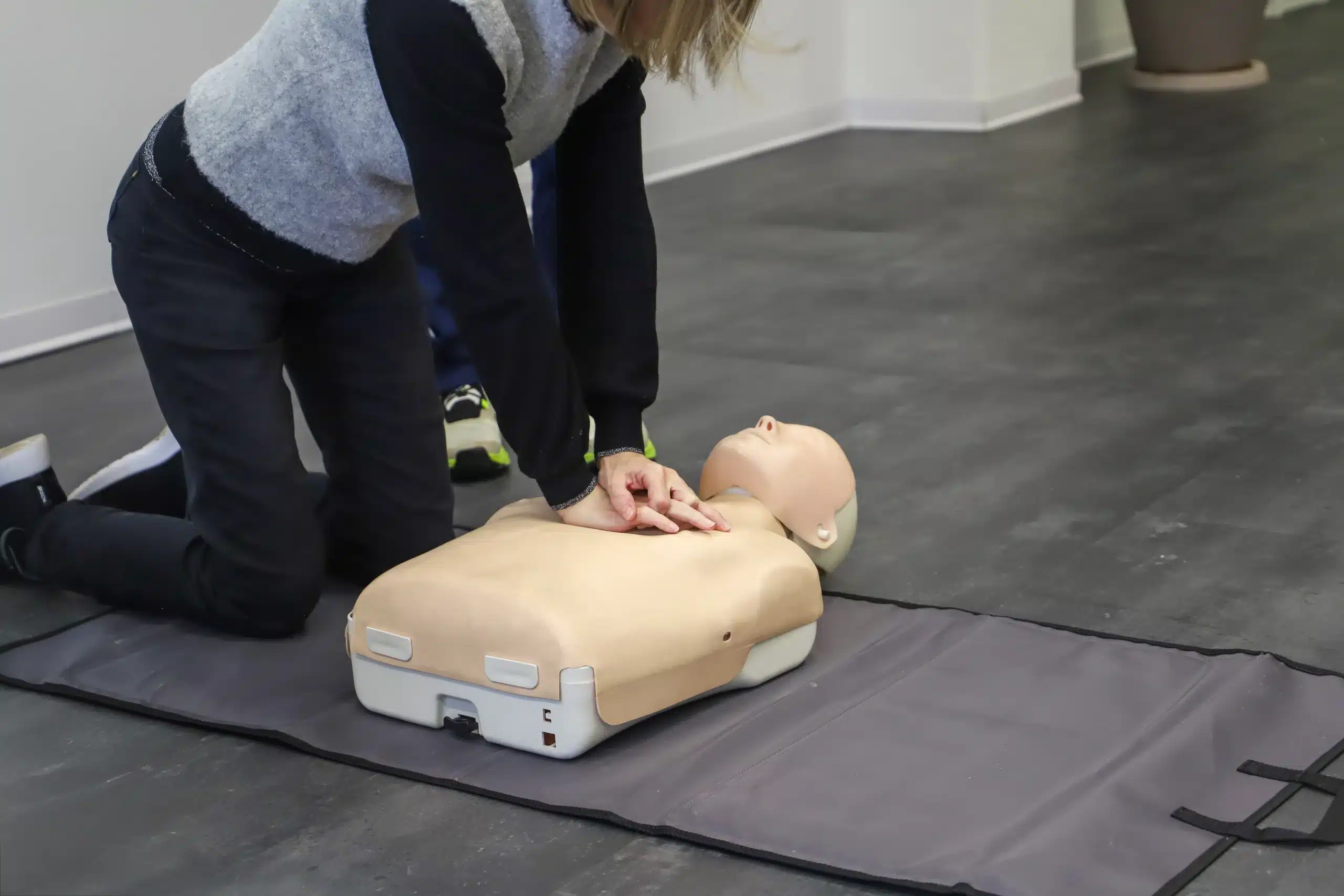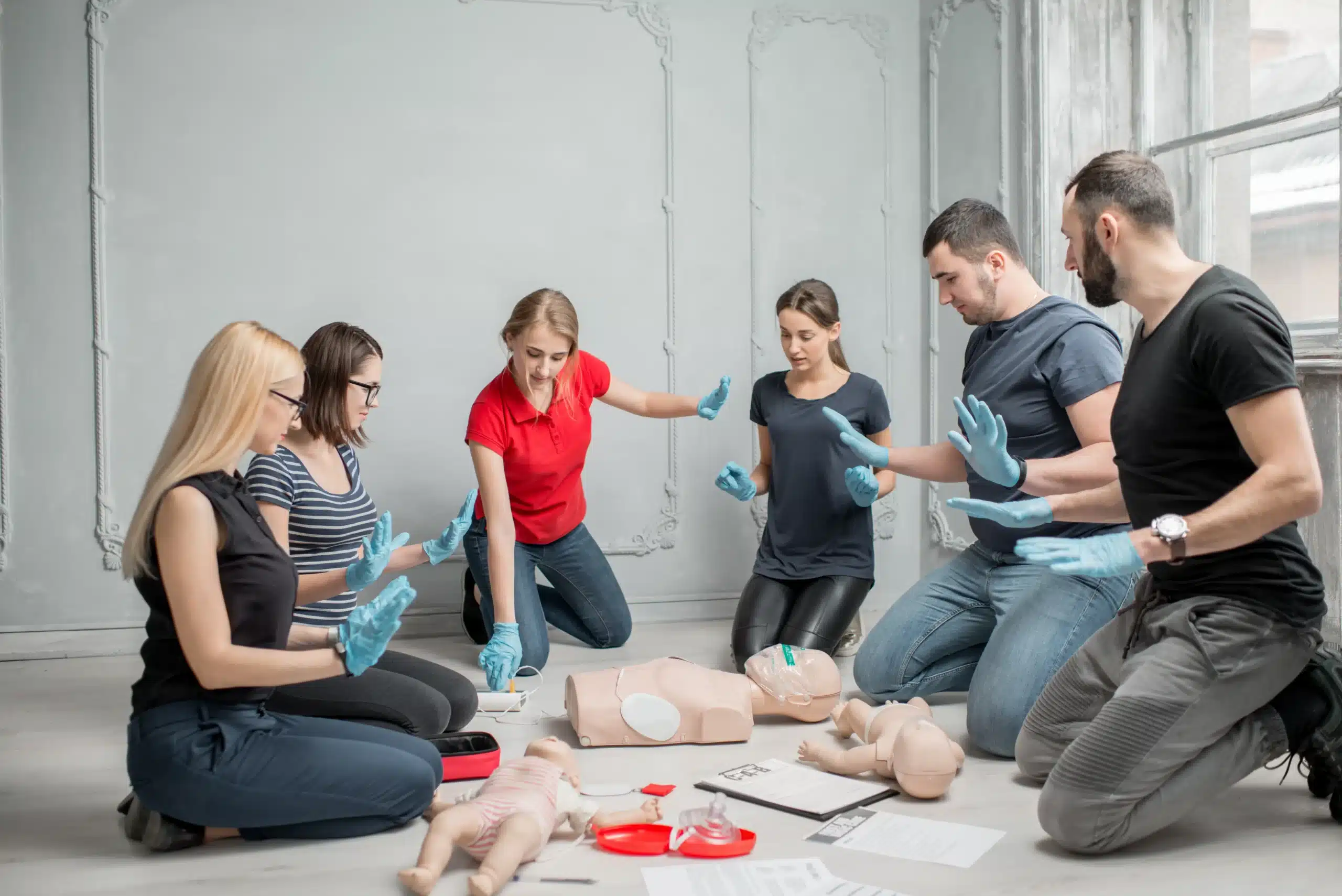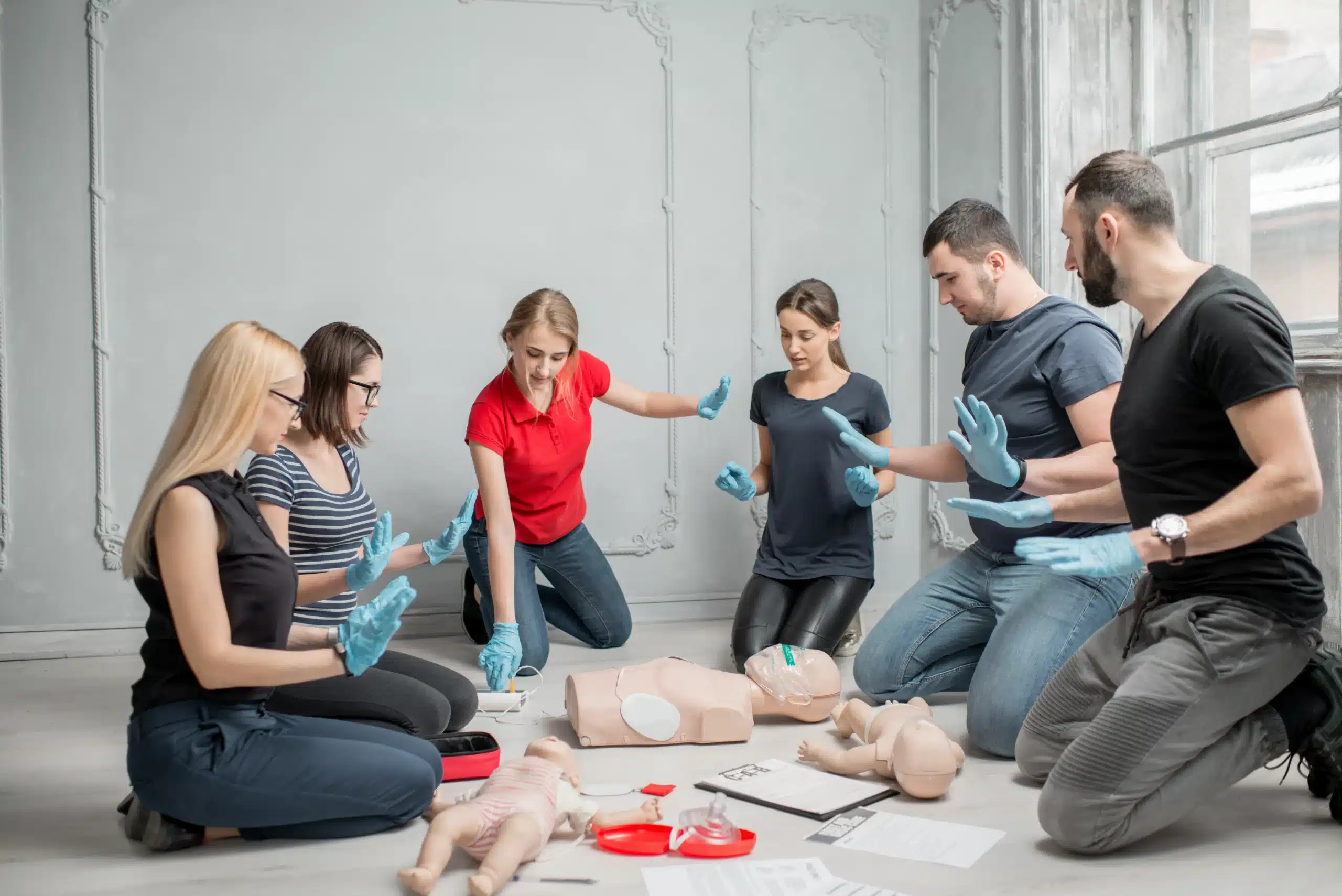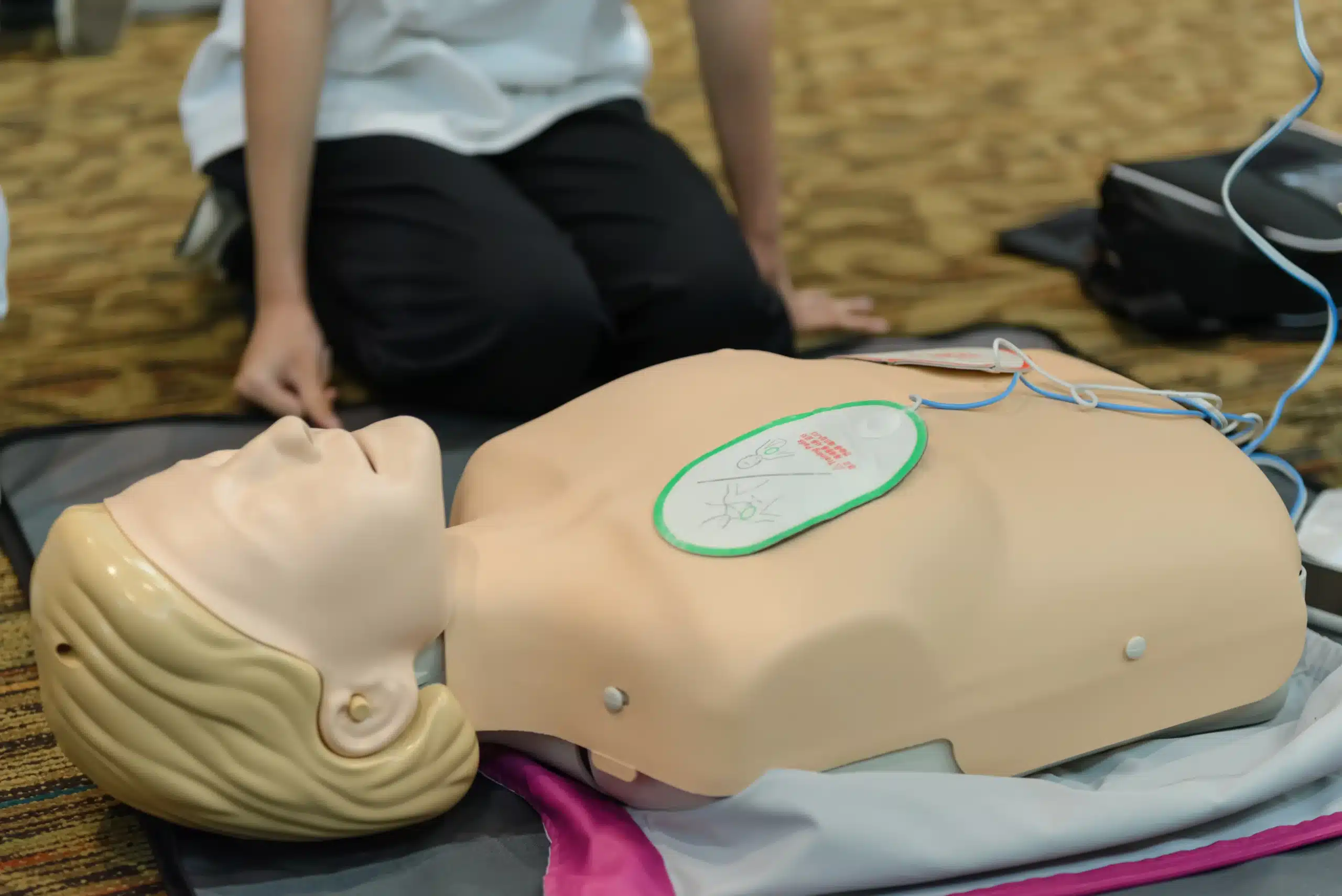Accidents happen, especially when children are involved. Whether it’s a minor scrape or a more serious situation, knowing how to respond effectively can make a world of difference. This guide provides a practical overview of pediatric CPR and first-aid training in Concord, offering valuable insights for parents, caregivers, teachers, and anyone working with children. We’ll explore the key components of these courses, discuss the differences between adult and child CPR, and provide resources for finding certified training programs in Concord. We’ll also address common concerns about CPR training and offer tips for maintaining your skills long-term. Get prepared to handle pediatric emergencies with confidence by exploring the world of pediatric CPR and first aid in Concord.
Key Takeaways
- Pediatric CPR and first aid empower you to act quickly during emergencies. These skills equip you to handle situations like choking, allergic reactions, and cardiac arrest in children, stabilizing them until professional help arrives.
- Training tailored to children’s unique needs is crucial. Their smaller bodies require specific techniques for CPR and first aid that differ from adult procedures. Learn these differences to provide safe and effective care.
- Find a reputable course and stay current with your skills. Look for certification from organizations like the American Heart Association and recertify regularly to maintain your knowledge and confidence.
What is Pediatric CPR and First Aid?
Knowing what to do in a medical emergency can make all the difference, especially when it comes to children. Pediatric CPR and first aid equip parents, caregivers, and anyone working with kids with the skills to respond swiftly and effectively to a range of situations, from minor injuries to life-threatening events. This specialized training focuses on the unique needs of infants and children, covering techniques tailored to their smaller bodies and distinct physiology.
Why Parents and Caregivers Need Training
Emergencies can happen anytime, anywhere. Having pediatric first aid and CPR training means you’re prepared to handle situations like choking, allergic reactions, and sudden cardiac arrest in children. These skills empower you to provide immediate care, potentially stabilizing a child until professional medical help arrives. Think of it as a safety net, offering you the confidence and ability to act quickly and decisively when a child’s health is on the line. For more insights on why these skills are so crucial for parents, check out this helpful article on pediatric first aid.
Key Differences: Adult vs. Pediatric CPR
While the basic principles of CPR remain consistent, there are important distinctions between adult and pediatric CPR. Children’s airways and chests are smaller, requiring adjustments in hand placement, compression depth, and rescue breathing techniques. Pediatric first aid also addresses common childhood injuries and illnesses differently than adult first aid. Understanding these key differences is essential for providing safe and effective care. This resource on pediatric first aid training highlights the specific skills and knowledge needed to respond to emergencies involving children.
Common Misconceptions
Many people hesitate to get CPR training due to common misconceptions. Some worry about performing CPR incorrectly or causing further injury. Others believe they’ll never need to use it. The truth is, even basic CPR knowledge can save a life. High-quality training programs address these concerns by teaching participants proper techniques and building confidence. Another misconception is that advanced certifications like PALS are only for medical professionals. However, anyone can benefit from this specialized training, especially those regularly caring for infants and children. Don’t let fear or misinformation hold you back from gaining these invaluable skills. Learn more about common CPR myths and empower yourself to be prepared for any situation.
Find Pediatric CPR & First Aid Courses in Concord
Finding the right pediatric CPR and first aid course can feel overwhelming, but several excellent resources are available in Concord. Here’s a rundown of local providers to help you in your search:
Safety Training Seminars: Your Local Expert
Safety Training Seminars offers convenient American Heart Association BLS, ACLS, PALS, and CPR classes in Concord. These courses cover essential life-saving skills for infants, children, and adults, making it simple for Concord residents to gain these vital skills. Check their website for a low price guarantee and various course schedules to find the perfect fit.
American Red Cross Offerings
The American Red Cross provides a comprehensive First Aid Training for Parents program, including Adult, Child, and Baby First Aid/CPR/AED training. This efficient program equips parents with the confidence to respond effectively in emergencies.
Votano CPR Programs
Votano CPR offers a Pediatric Heartsaver® First Aid/CPR/AED blended learning course. This course combines online learning with in-person skills sessions, teaching essential techniques for Adult/Child/Infant CPR/AED and pediatric first aid.
In Home CPR Services
For added convenience, In Home CPR brings First Aid, CPR, and BLS certification classes directly to your Concord home or business. This personalized approach allows families and organizations to train together in a comfortable, familiar setting.
Local Hospitals and Community Centers
Many local hospitals and community centers also offer CPR and first aid courses. Check with facilities like John Muir Health or the City of Concord’s Parks and Recreation Department for potential programs. Websites like Concord CPR Classes can also help you find AHA-certified courses, including BLS, ACLS, PALS, and comprehensive first-aid training. These courses are valuable for anyone wanting to improve their emergency response skills.
Course Structure and Certification: What to Expect
Want to know what to expect during your Pediatric CPR and First Aid training? This section breaks down the typical course structure, time commitment, and the certification you’ll receive.
Blended Learning: Online & In-Person
Many Pediatric First Aid/CPR/AED courses use a blended learning format. This means you’ll complete online coursework at your own pace before attending a shorter, in-person skills session. This approach allows you to learn the material beforehand and maximize your hands-on practice time with the instructor. It’s important to fully complete the online modules before your in-person session. These blended learning courses are generally designed for parents, caregivers, and teachers—not healthcare providers who require more advanced training, such as ACLS.
Duration and Time Commitment
The in-person portion of a blended learning course typically lasts around two to two and a half hours. This focused session allows instructors to cover essential skills effectively while respecting your busy schedule. Check with your chosen provider for specifics on their in-person session length. Contact Safety Training Seminars for more information about our course schedules.
Skills You’ll Learn
Pediatric CPR and First Aid courses cover a range of life-saving techniques. You’ll learn how to perform CPR on infants, children, and adults, and how to use an AED. The course also covers essential first aid skills, equipping you to handle common childhood injuries and emergencies. This comprehensive training gives you the confidence to respond effectively in various situations. Find a CPR class near you to get started.
Certification Types and Validity
After successfully completing the course and skills assessment, you’ll receive a certification in Adult and Pediatric First Aid/CPR/AED, often valid for two years. This certification demonstrates your preparedness to handle pediatric emergencies and is a valuable credential for anyone working with or caring for children. Remember to check with your specific training provider for details on certification validity and renewal requirements. Safety Training Seminars offers convenient and affordable options for initial certification and recertification.
Costs, Discounts, and Value
Knowing the price range for Pediatric CPR and First Aid certification courses helps you budget effectively. This section breaks down average costs, potential discounts, and how to find the best value.
Average Course Prices in Concord
Pediatric CPR and First Aid training costs in Concord vary based on the provider, course format (blended learning or in-person), and the depth of instruction. Generally, combined CPR and First Aid certification courses range from $75 to $150. Safety Training Seminars offers various American Heart Association (AHA) certified courses, including BLS, ACLS, PALS, CPR, and First Aid, often with competitive pricing. For those specifically looking for First Aid training, resources like the First-Aid Training in Concord guide can offer additional insights into local providers and price ranges. You can find more information on Safety Training Seminar’s CPR training options for the Concord area.
Available Discounts and Promotions
Many training providers offer discounts for group registrations, students, or returning customers. Keep an eye out for seasonal promotions or early bird discounts, too. Concord CPR Classes sometimes have special offers, so checking their website is worthwhile. Exploring options like CPR classes offered through Bay Area CPR may reveal different pricing structures or promotions.
Safety Training Seminars’ Low Price Guarantee
Safety Training Seminars is committed to providing affordable, high-quality training. They offer a low price guarantee, ensuring you receive excellent value. This commitment to affordability, combined with their use of the streamlined RQI program from the AHA, makes them a strong option for your training needs. Their focus on serving Northern California, including Concord, makes them a convenient local choice. You can explore their various courses and pricing by contacting them.
Choose the Right Course
Finding the right pediatric CPR and first aid course requires a little research. It’s a decision that impacts your confidence and ability to respond effectively in an emergency, so take your time and consider these points.
Factors to Consider
First, think about who will be primarily using these skills. Are you a parent, grandparent, nanny, or teacher? Do you work with infants, toddlers, or older children? Pediatric first aid training equips you with the skills to handle emergencies involving children, and some courses focus on specific age groups. Make sure the course you select aligns with the ages of the children you’ll be caring for. Also, consider whether you need basic pediatric first aid or more comprehensive training. If you’re unsure, contact us – we can help you determine the best fit.
Balance Quality, Convenience, and Cost
It’s essential to find a balance between quality instruction, convenience, and affordability. Look for courses certified by reputable organizations like the American Heart Association (AHA). Safety Training Seminars offers AHA-certified courses using the RQI program, a streamlined approach that’s particularly helpful for busy professionals. Consider factors like class location, schedule, and overall cost. Do you prefer a weekend course, an evening class, or a blended learning option with online components? Explore different options to find what works best for your schedule and budget.
Check Reviews and Feedback
Before committing to a course, do some digging. Look for reviews and testimonials from past participants. Websites like Yelp can offer insights into the quality of instruction, the learning environment, and the overall experience. Don’t hesitate to ask the training center for references or contact them directly with any questions. A reputable provider will be happy to address your concerns and provide additional information. Also, confirm that the certification you’ll receive is recognized and accepted in your field, especially if you’re a healthcare professional. Remember, taking a PALS certification isn’t just for hospitals; it empowers anyone to respond to pediatric emergencies. Finally, compare pricing and be sure to ask about any available discounts or our low price guarantee.
Prepare for Your Course & Maintain Skills
Knowing what to expect and how to prepare can make your pediatric CPR and first aid training more effective. This section covers everything from pre-course prep to maintaining your skills long-term.
What to Expect During Training
Pediatric first aid and CPR courses cover a range of life-saving techniques, including how to respond to choking incidents, administer CPR, and provide first aid for common childhood injuries. These courses equip new parents and caregivers with essential skills for handling accidents at home. Expect a combination of instruction, demonstrations, and hands-on practice. Participating in a certified pediatric first aid training course builds comprehensive knowledge and confidence for responding in emergencies.
Tips for Success
Active participation is key to maximizing your learning. In a hands-on class, you’ll practice on a CPR training mannequin, learning proper hand placement and compression depth for both infants and children. Understanding the key differences between adult and pediatric CPR is crucial for providing appropriate care. Specialized pediatric first aid training will give you the confidence to handle emergencies involving children.
Why Recertify Regularly?
CPR and first aid guidelines and best practices evolve. Regular recertification keeps your skills current and ensures you’re prepared to respond effectively in any situation. Refresher courses reinforce your knowledge and help maintain long-term skill retention. Studies show that distributed practice with real-time feedback improves CPR quality and skill retention among pediatric healthcare providers. This short training can truly save a life.
Practice & Stay Informed
Even after certification, continued practice is essential. Consider practicing your skills with a CPR mannequin or reviewing course materials periodically. Staying informed about updates to guidelines is also important. The use of real-time feedback during CPR training improves CPR performance30296-X/fulltext) in healthcare providers. PALS certification is a valuable skill set for anyone who cares for children, not just hospital staff. Check with organizations like Bay Area CPR for information on common misconceptions and ongoing training opportunities.
Additional Resources in Concord
Beyond formal CPR and first-aid certification courses, Concord offers several resources to support your ongoing learning and community engagement. Knowing where to find these resources can help you stay up-to-date on best practices and connect with other caregivers.
Local Support Organizations
Several organizations in and around Concord provide valuable resources and support for those interested in first aid and CPR training. Safety Training Seminars, for example, offers a range of American Heart Association-certified courses to ensure community members have access to essential, life-saving skills. For a broader view of CPR training options in Northern California, check out this helpful CPR directory. Concord CPR Classes also offers a variety of AHA-certified courses, from Basic Life Support (BLS) to Pediatric Advanced Life Support (PALS) and comprehensive first-aid training.
Ongoing Education
Maintaining your skills is crucial, especially in healthcare. The American Heart Association’s RQI program, a streamlined approach to recertification, is particularly beneficial for busy professionals seeking efficient ways to stay current with the latest guidelines. For those specializing in pediatric care, staying informed about PALS guidelines is essential for managing pediatric emergencies effectively.
Community Workshops and Events
Concord fosters a culture of safety and preparedness through various community workshops and events. These opportunities provide a chance to practice your skills, learn new techniques, and connect with other community members. Check with local hospitals, community centers, and organizations like the Red Cross for upcoming events related to CPR, first aid, and other safety training. These workshops often cater to specific groups, such as parents, offering tailored instruction and support. Participating in these events can help you build confidence and maintain your life-saving skills.
Related Articles
- 7 Common CPR Myths Debunked – San Francisco Bay Area CPR Classes
- CPR Training in Northern California: Your Complete Guide
- The Lifesaving Importance of CPR in Healthcare
- First Aid Classes San Francisco: Your Complete Guide
- CPR Certification in San Jose: A Complete Guide
Frequently Asked Questions
What if I’m nervous about performing CPR on a child? It’s completely normal to feel apprehensive about performing CPR, especially on a child. High-quality training programs emphasize hands-on practice and build confidence through realistic scenarios. Remember, any attempt at CPR is better than none. Your training will equip you with the skills and knowledge to act quickly and effectively, even under pressure.
How do I choose the right pediatric CPR and first aid course for me? Consider your specific needs. Who will you be caring for – infants, toddlers, or older children? Do you need basic or more comprehensive training? Think about your schedule and budget, too. Blended learning (online and in-person) offers flexibility, while traditional in-person classes provide a more structured learning environment. Read reviews and compare prices before making a decision.
Is online-only CPR training sufficient? While online courses offer valuable knowledge, hands-on practice with a certified instructor is essential for mastering CPR techniques. Blended learning courses combine the convenience of online learning with the crucial in-person skills sessions. For proper certification, you’ll need both components.
How often do I need to recertify in pediatric CPR and first aid? Certification is typically valid for two years. Regular recertification ensures your skills and knowledge are up-to-date with the latest guidelines and best practices. Even if your certification is still valid, periodic practice and review are highly recommended to maintain proficiency.
What if I can’t afford the cost of a CPR and first aid course? Many training providers offer discounts for groups, students, or returning customers. Look for seasonal promotions or scholarships, too. Some organizations may offer free or low-cost training programs to specific community members. Don’t hesitate to contact providers directly to inquire about financial assistance options.


